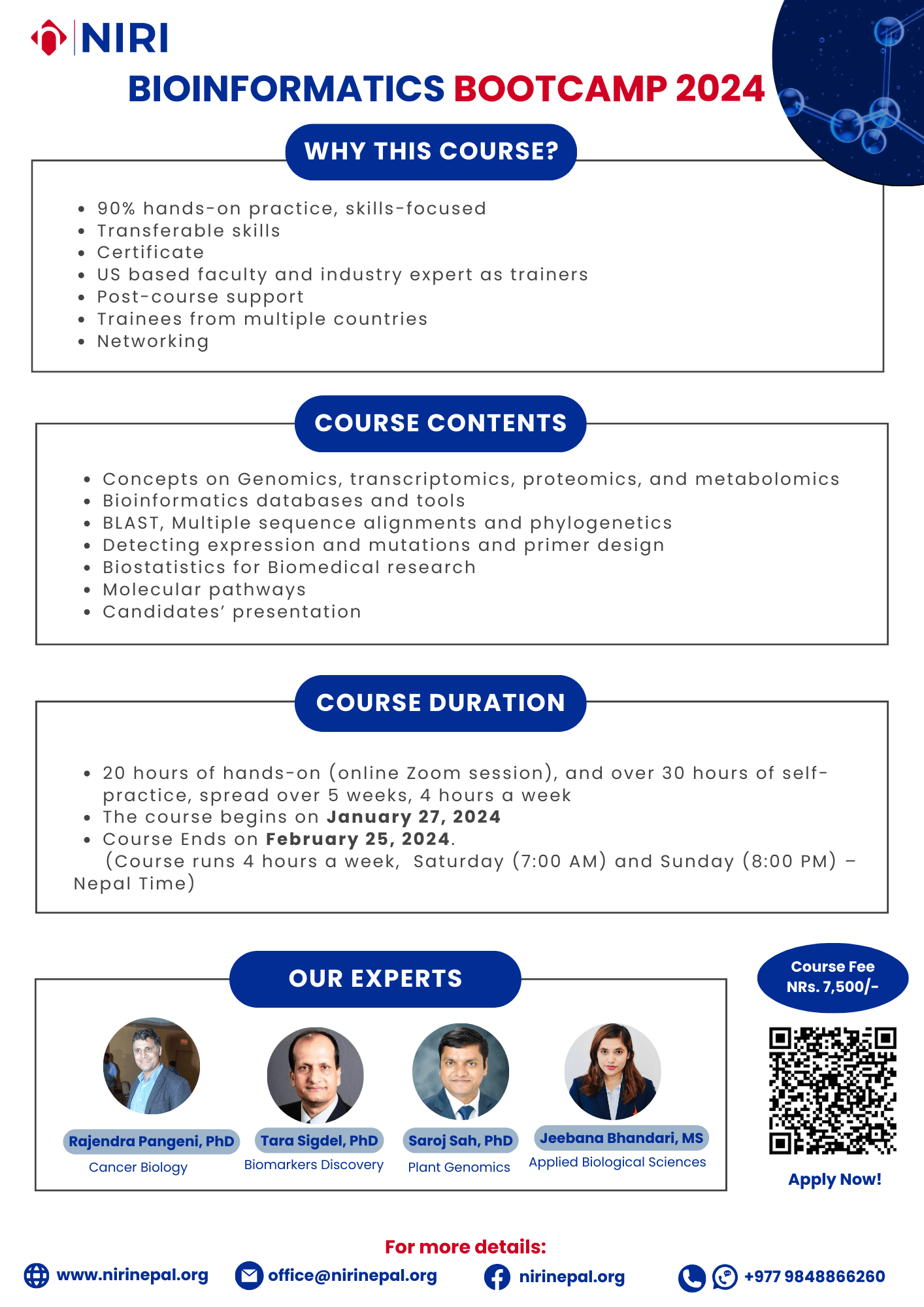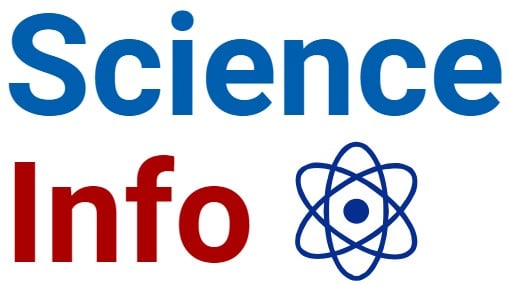NIRI is organizing 20 hours of hands-on (online Zoom session) and over 30 hours of self-practice Bioinformatics Bootcamp 2024 from January 27, 2024 (Two days a week, i.e., Each Saturday (7:00 AM) and Sunday (8:00 PM) – Nepal Time over six weeks until February 25, 2024.

Interesting Science Videos
Why this course?
- To provide hands-on skills in analyzing genes of interest and their associated protein structure, diseases, and metabolic pathways.
- To gain insights on various bioinformatics databases and tools important for undergraduate/masters/PhD studies and research works.
- To learn basic practical skills in bioinformatics that are important for research works on biosciences and related areas.
Who should enroll in this course?
- Undergraduate/masters/PhD students, Faculty members and researchers of life sciences interested in gaining bioinformatics skills
- Computer scientists interested in developing biology-track bioinformatics skills.
What can you expect from the course?
The course mainly focuses on key topics that would help to build a foundation on bioinformatics for research works on biomedical fields or to explore further taking bioinformatics as a career. This course covers basic bioinformatics and other topics important for laboratory research work.
In addition, the course is designed so that each trainee is encouraged to take their own route of learning during the workshops or/and on their own.
Course duration
20 hours of hands-on (online Zoom session), and over 30 hours of self-practice.
The course is spread over 6 weeks, 4 hours a week, plus two hours of additional sessions within six weeks.
The course will start from January 27, 2024 (Two days a week i.e Each Saturday (7:00 AM) and Sunday (8:00 PM) – Nepal Time over 6 weeks.
The full schedule will be provided before the session begins.
Training/program approach
- Over 90% practical/hands-on workshops. Basic biology is covered during the workshops itself.
- Each trainee is given an accession number of a set of genes. Alternatively, they can choose genes of their interest.
- Each trainee will work on their own gene/protein to provide the trainee an opportunity to independently research their own gene/protein/sequences given.
- The trainees will be able to produce a short report, thesis, or a bioinformatics -based manuscript if interested.
- This training will lay the foundation for future intermediate and advanced level training offerings in bioinformatics or related fields; some of them will be offered from NIRI in the future or a foundation to pursue higher studies in bioinformatics.
Course fee
Nepal: Rs. 7,500.00 includes course registration of Rs. 1500.
USA and North America (100 USD), UK (100 GBP), Europe (100 Euro)
Fee for individual module/Week: Rs. 2000 (or 25 USD/GBP/Euro)
Financial Aid/Scholarship
Prabin Dhakal Scholarship funded by Rishi Dhakal is available for 4 deserving bootcamp participants.
Please register here for the bootcamp before applying scholarship.
Please fill up the form to apply for this scholarship. The deadline for the scholarship application is January 5, 2024. Result of the scholarship will be announced on January 15, 2024. Click here to apply for financial aid.
Course Instructors
Rajendra Pangeni, PhD (Cancer Biology/Genomics)
Tara Sigdel, PhD (Biomarkers discovery)
Saroj Sah, PhD (Molecular Biology)
Jeebana Bhandari, MS (Applied Biological Sciences)
Course Details
Week 1: Program/Course orientation and introduction -4 hours
Program/Course orientation-2 hour
Group introduction and course overview
Allocation of individual plans (accession numbers/genes of interest to work on)
-Basics of Genomics, Transcriptomics, Proteomics, and Metabolomics and their relevance in bioinformatics- 2 hr
Week 2: -Biological Databases and tools-4 hours
-Gene/protein structure, sequence retrieval, Open reading frame (ORF), sequence formats/FASTA etc- 2 hour
-Databases and tools to analyze a gene/protein of interest- 2 hour
Week 3-Sequence analyses- 4 hours
Sequence similarity searching (eg. BLAST)
Pairwise/multiple sequence alignment and phylogenetics
Week 4: Specialized databases and bioinformatics tools in laboratory-based research work hours
-Detecting/determining mutation/expression of a gene of interest – 2 hours
Primer design to amplify gene to detect if the given gene is mutated and to determine its expression at mRNA level (qRT)
-Exploring available disease databases (mutation, expression, and DNA methylation) and retrieving the data for the gene (s) of interest- 2 hours
Week 5: Gene set enrichment analyses, pathways, and specialized future offerings -4 hours
-Gene network and pathway analyses -2 hr
-Individual presentation and Further learning -2 hr
Application Deadline: Jan 20, 2024
